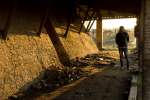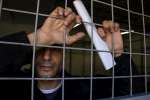Remarks by the UN High Commissioner for Refugees to the EU Justice and Home Affairs Council
Statements by High Commissioner, 24 February 2011
Brussels, 24 February 2011
The High Commissioner was invited to attend and address Ministers on the subject of the commemorations in 2011 of the anniversaries of the 1951 Convention Relating to the Status of Refugees and the 1961 Convention on the Reduction of Statelessness. In light of current events and with several other items of interest to UNHCR on the agenda, the High Commissioner's remarks addressed this wider range of issues, as summarised below.
-
You may think that I come to you from outer space when I come to speak about the commemorations at a time when many other pressing issues are occupying you. Allow me to provide a brief update on the commemorations, and then turn to other questions of concern.
-
The anniversaries represent a very good opportunity for Europe to discuss its role in the international protection system. On 7-8 December 2011, I will convene a Ministerial Conference in Geneva. There, we will seek guidance from states on how to fill protection gaps, in the context of new trends in migratory and refugee flows and on how to strengthen responsibility-sharing. We will also call on States to make pledges to improve the situation and lives of refugees and other persons of UNHCR's concern.
-
The European Council, which will meet the day after that conference on 9 December, could issue a declaration, following that which it issued on the 50th anniversary ten years ago, in which it would reaffirm the EU's commitment to international law, the international protection regime and refugees.
-
Among other potential pledges that I dare suggest to Member States are:
-
On statelessness – the less well-known area of our mandate – I note that 6 Member States have not ratified the 1954 Convention, and 14 have not ratified the 1961 Convention. Our suggestion to those Member States is to consider ratifying these Conventions, and announcing it at the Ministerial Conference in December.
-
There area few countries which have national systems for determining statelessness – Hungary, for example. Introducing such systems would also be a positive step.
-
Concerning the 1951 Refugee Convention, some Member States maintain reservations (e.g. in relation to free movement of refugees; the right to work; freedom of association). These could be lifted as part of the pledging process.
-
Establishment or expansion of resettlement quotas; and
-
Measures to enhance asylum systems, or integration measures.
-
At the Ministerial Conference, instead of acrimonious north-south debate, I would like to see a constructive process where States will pledge to make positive improvements on protection.
Burden- and responsibility-sharing
-
This is a subject on which we will seek guidance at the Ministerial Conference.
In the EU context, this issue has both external and internal dimensions.
-
Outside the EU, responsibility-sharing is needed in the form of increased support to refugees. Some 80% of the world's refugees are in the developing world. It is in everyone's interest to improve their situations; both that of their host countries/regions and the developed world. Resettlement also represents an important form of responsibility-sharing. Better links between development policies on the one hand, and asylum-migration policies and actions on the other, are also needed. This is evident in the case of assistance, for example, to promote integration of Burundians in Tanzania, or to make return more sustainable for Afghans coming back to Afghanistan from other countries in the region.
-
Responsibility-sharing is also needed in the European context (although this will not be an issue in UNHCR's Ministerial Conference). This can be encouraged through enhancing the capacity of the EASO – to which I pledge UNHCRs support. Asylum Support Teams, coordinated by the EASO, will be an important new initiative in this area. The Dublin II 'emergency mechanism'that the EC is proposing would also be a positive step. The Stockholm Programme also envisages joint processing; this is something that should be further considered. There are other, more specific measures for states which suffer pressures. I hope that these ideas will be debated further in the Council.
-
The EU must continue to look for ways to respond to the global megatrends in migration – fuelled by conflict, food insecurity, natural disasters, climate change. All of these force people to move and responses are needed.
North Africa: movements in and from the region
-
Following the events and movements of recent weeks, allow me to set out what UNHCR is doing.
-
In Tunisia, the new government has agreed to conclude an accord de siege with UNHCR, and we are preparing to set up a regional hub to coordinate activities throughout the Maghreb. At present we have a team at the Tunisian-Libyan border. Five emergency experts will arrive tomorrow in Jerba, with expertise in logistics, protection and assistance. A flight with relief items will also land tomorrow. We will subsequently procure further needed items locally.
-
A cooperation platform is being established with IOM and collaboration set up with the Tunisian Red Crescent.
-
Arrivals at the Tunisian border are mainly of Tunisian nationals but there are also Libyans and many third country nationals seeking to return to their home countries. Only a small number appear to be seeking protection. UNHCR will make available support as needed with regards to monitoring, reception, assistance, screening and processing. In cooperation with the authorities, a site has been selected for a camp if it would be needed, some 7km from the border.
-
In Egypt, relations with the former government were difficult. However, the situation is improving and our office has reopened after a brief closure. Egyptian nationals are returning in large numbers from Libya. Libyans and third country nationals are arriving also crossing. Egypt importantly is keeping its borders open, and no refoulement has been observed. Third country nationals may include refugees and asylum-seekers registered with UNHCR in Libya as well as those who had not been able to register with us there.
-
In the EU, we are at the disposal of Member States to support them as needed.
In Italy, we are continuing to provide and expanding the support we had developed under the 'Praesidium' project, in which we offer assistance in reception, screening, counselling and other areas.
-
It is important to distinguish between two situations:
-
A migration situation, as we have seen recently with the arrival of Tunisians, moving primarily for economic reasons. Such migrants need to be treated with respect for their rights and dignity; but also in accordance with Member States'migration policies. In the Tunisian flows there may be some people in need of, and they should receive access to asylum and fair claim determinations.
-
If a fully-fledged civil war were to break out in Libya, this could lead to a massive outflow of Libyans and third country nationals who are now present in the country. Refugees and other persons of concern to UNHCR in Libya are particularly at risk in the current situation and have been targeted by recent violence.
-
Large scale arrivals can be expected first and foremost to affect the neighboring countries. This calls for support to Tunisia and Egypt, who would receive the bulk of arrivals. However, significant numbers could flow to the EU. If that were to happen, it would be essential to guarantee access to safety for these people – they would require access to territory and, if they claim protection, to asylum procedures. UNHCR would be ready to provide necessary forms of support: in relation to reception, screening, processing, detection of vulnerable people, and otherwise. For now, Member States should undertake contingency planning in a discreet way; and UNHCR is ready to support this.
-
In case of a massive inflow, UNHCR suggests that Member States consider using the instrument in EU law that was designed for this – the Temporary Protection Directive. This is a decision for EU States to take, and would apply in event of a 'mass influx'of people with protection needs.
-
For now, however, the first priority is support to Tunisia and Egypt, and of course the people of Libya.
On Greece
-
The current events in N. Africa should not distract us from structural problems and challenges within the EU. In Greece, UNHCR fully supports the asylum reform process, working in cooperation with the Greek authorities. We will be working closely with EASO. Progress has been made, but there is a long way to go. UNHCR makes a strong appeal to the Greek government to ensure that this reform is a truly national project; and to other Member States to provide their support.
-
In addition to practical cooperation, there is a need for a strong legal framework in the Union. UNHCR supports the legislative process at EU level in this regard.
-
There are challenges and opportunities ahead. The new EU financial perspectives for 2014-20 must address the needs of asylum and protection, both outside and within the Union.
-
Having established the objective of having the Common European Asylum System fully in place in 2012, the EU must continue to provide its strong commitment of political will and resources to achieve this.
Bureau for Europe 24 February 2011










































